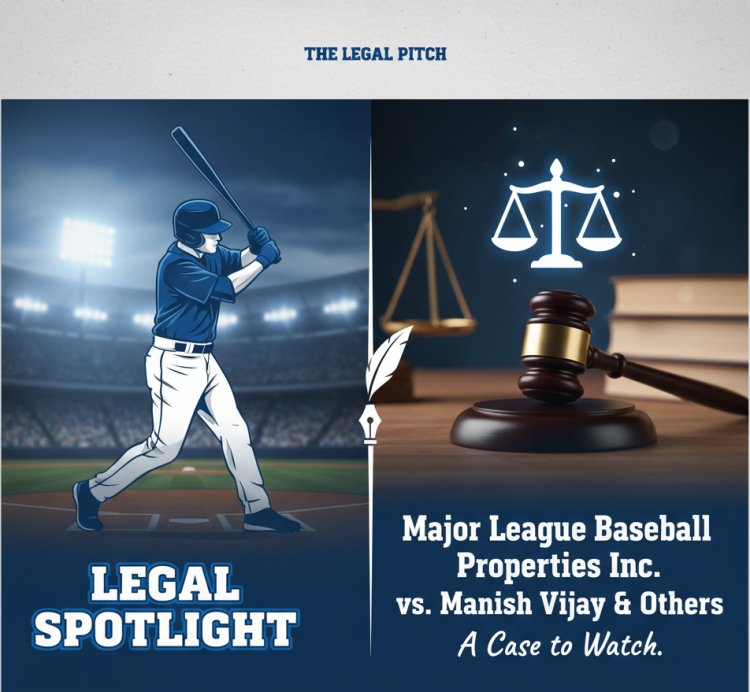Legal Spotlight: Major League Baseball Properties Inc. vs. Manish Vijay & Others – A Case to Watch.
The Delhi High Court’s decision in Major League Baseball Properties Inc. v. Manish Vijay & Ors., (C.O. (COMM.IPD-TM) 279/2023) highlights the supremacy of prior user rights in Indian trademark law. Major League Baseball (MLB), the global rights holder of the ‘BLUE JAYS’ mark since 1976, successfully sought the cancellation of the deceptively similar ‘BLUE-JAY’ mark registered by Indian respondents. The court held that the respondents adopted the mark in bad faith, lacking credible evidence of honest use. It further affirmed that transborder reputation, bolstered by online presence and media exposure, can establish goodwill in India even without direct commercial operations. Importantly, the court ruled that abandonment of MLB’s own registration did not bar its right to file for rectification. This case underscores the protection of international trademarks against dishonest local registrations and reiterates the importance of genuine adoption and use in trademark disputes.

Introduction
The Major League Baseball Properties Inc. (MLB), based in New York, is the intellectual property holding company for Major League Baseball. They adopted the trademark ‘BLUE JAYS’/‘TORONTO BLUE JAYS’ back in 1976 for their Toronto team and have registered this mark globally, including several applications in India specifically for clothing under Class 25. On the other hand, the respondents, who are partners of M/s. PMS Creations, managed to secure registration for the mark ‘BLUE-JAY’ in Class 25 (for readymade garments) in India, based on an application they filed in 1998 on a ‘proposed to be used’ basis. MLB raised an opposition to this registration, but unfortunately, their opposition was considered abandoned due to a delay in filing necessary evidence. This led to the current situation where MLB has filed for rectification (or cancellation) of the respondents’ mark. In the case at hand, there are several key issues regarding the trademark ‘BLUE JAYS’ to be addressed. First, it is to be determined whether the petitioner qualifies as the 'prior adopter' and 'prior user' of the ‘BLUE JAYS’ mark for goods that are identical or similar. Another important aspect to consider is whether the respondents adopted the contested mark ‘BLUE-JAY’ in good faith or not. Additionally, it is essential to evaluate if the petitioner’s ‘BLUE JAYS’ mark has established enough reputation and goodwill in India to warrant the cancellation of the respondents’ registration. Lastly, it is discussed whether the petitioner’s abandonment of their own application in Class 25 has any impact on their rectification claim under Section 57 of the Trade Marks Act, 1999.
Arguments
Petitioner
The petitioner, Major League Baseball (MLB), highlights that the ‘BLUE JAYS’ mark has been in use since 1976 and has developed a strong global reputation, with registrations and a presence in several countries, including India. They argue that the respondents’ ‘BLUE-JAY’ mark is deceptively similar and appears to be an attempt to capitalize on MLB's established goodwill and reputation in the Indian market. Additional materials submitted demonstrate MLB's online presence, product availability, and media coverage in India dating back to the mid-1990s, which they believe supports the idea of a reputation spill over. The petitioner points to the bad faith of the respondents, citing inconsistencies in their explanations regarding the adoption of the mark. Furthermore, MLB asserts that prior user rights under Indian law take precedence over mere registration.
To know more about this you can follow the link below:
Respondent
The Respondent contended that the "BLUE-JAY" was adopted by them in 1998, who were inspired either by a North American bird or a local resort, and they did so in good faith, without any reference to Major League Baseball’s marks. It's worth noting that the petitioner’s reputation and use are largely confined to North America, and baseball isn't widely followed in India, where no evidence of actual use or reputation was provided. Furthermore, at the relevant time, the petitioner did not have a valid registration in Class 25 in India. This means that the respondents, with their sales and promotion of "BLUE-JAY," can be considered prior and continuous users in the garment sector. Overall, there seems to be no likelihood of confusion between the two, as their fields of activity are unrelated.
Decision
The inspiration regarding the adoption of ‘BLUE-JAY’ by the respondents revealed a hint of suspicion, as their explanations appeared to change over time and lacked credible evidence to support their claims. The only notable difference between the two marks was the omission of an ‘S’ and the addition of a hyphen, which clearly suggests imitation. Furthermore, the documentary evidence provided by the respondents regarding their use of the mark was minimal and seemed to be dated after the fact, indicating a lack of good faith in their actions. On the other hand, the petitioner successfully established a strong reputation worldwide, showing that their brand had begun to make an impact in India through early trademark applications, a solid online presence, and various media broadcasts. It’s important to note that Indian law favours the 'prior user' and asserts that mere registration doesn’t legitimize dishonest practices. Additionally, the fact that the petitioner’s own application in Class 25 was abandoned or unregistered doesn’t prevent them from seeking cancellation.
The Hon’ble High Court of Delhi ordered the cancellation and removal of the trademark ‘BLUE-JAY’ (registration number 815236, Class 25) that was registered in favour of the respondents. The court determined that the petitioner was the prior adopter and user of the trademark, while the respondents were found to have adopted it in bad faith.
Conclusion
The significance of trademark protection under Indian law highlights the importance of bona fides and honest adoption. It emphasizes that prior user rights take precedence over registered rights when bad faith and imitation are evident. Additionally, it clarifies that a reputation gained abroad, as long as there is some demonstrable presence or accessibility in India, can be enough to protect against local imitators. This understanding helps ensure that fair practices are upheld in the trademark landscape.












